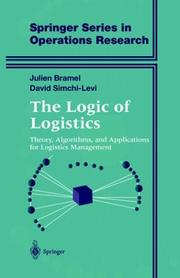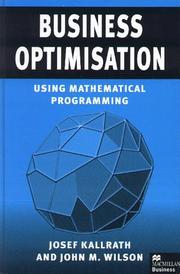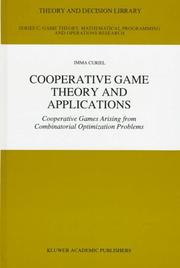| Listing 1 - 9 of 9 |
Sort by
|

ISBN: 0906212200 9780906212202 Year: 1997 Publisher: Norfolk: Tarquin publications,
Abstract | Keywords | Export | Availability | Bookmark
 Loading...
Loading...Choose an application
- Reference Manager
- EndNote
- RefWorks (Direct export to RefWorks)
519.8 --- 519.8 Operational research --- Operational research --- Geometrical models.

ISBN: 0387949216 Year: 1997 Publisher: Berlin Springer
Abstract | Keywords | Export | Availability | Bookmark
 Loading...
Loading...Choose an application
- Reference Manager
- EndNote
- RefWorks (Direct export to RefWorks)
Business logistics --- Operations research --- 519.8 --- Operational analysis --- Operational research --- Industrial engineering --- Management science --- Research --- System theory --- Supply chain management --- Industrial management --- Logistics --- 519.8 Operational research

ISBN: 0333676238 9780333676233 Year: 1997 Publisher: Basingstoke: MacMillan,
Abstract | Keywords | Export | Availability | Bookmark
 Loading...
Loading...Choose an application
- Reference Manager
- EndNote
- RefWorks (Direct export to RefWorks)
Planning (firm) --- Programming (Mathematics) --- Decision support systems. --- Business --- Data processing. --- 519.8 --- 519.85 --- Operational research --- Mathematical programming --- 519.85 Mathematical programming --- 519.8 Operational research --- Decision support systems --- Data processing --- Business - Data processing

ISBN: 0534520219 Year: 1997 Publisher: Belmont, Calif. Duxbury
Abstract | Keywords | Export | Availability | Bookmark
 Loading...
Loading...Choose an application
- Reference Manager
- EndNote
- RefWorks (Direct export to RefWorks)
Planning (firm) --- Numerical methods of optimisation --- 519.8 --- Operational research --- algoritme --- operationele research --- lineaire algebra --- lineaire programmering --- sensitiviteitsanalyse --- markov algoritme --- lindo --- lingo --- Contains audio-visual material --- 519.8 Operational research
Book
ISBN: 0314096876 Year: 1997 Publisher: St. Paul, Minn. West Publishing
Abstract | Keywords | Export | Availability | Bookmark
 Loading...
Loading...Choose an application
- Reference Manager
- EndNote
- RefWorks (Direct export to RefWorks)
519.8 --- 519.2 --- Management science --- Quantitative business analysis --- Management --- Problem solving --- Operations research --- Statistical decision --- 519.2 Probability. Mathematical statistics --- Probability. Mathematical statistics --- 519.8 Operational research --- Operational research --- Operational research. Game theory --- Planning (firm)

ISBN: 0792395158 Year: 1997 Publisher: Boston Kluwer
Abstract | Keywords | Export | Availability | Bookmark
 Loading...
Loading...Choose an application
- Reference Manager
- EndNote
- RefWorks (Direct export to RefWorks)
Production scheduling --- 519.8 --- Job scheduling (Production control) --- Job-shop scheduling --- Project scheduling (Production control) --- Scheduling (Management) --- Production control --- Scheduling --- 519.8 Operational research --- Operational research --- Data processing --- Production management

ISBN: 0792344766 1441947752 147574871X 9780792344766 Year: 1997 Volume: 16 Publisher: Boston: Kluwer,
Abstract | Keywords | Export | Availability | Bookmark
 Loading...
Loading...Choose an application
- Reference Manager
- EndNote
- RefWorks (Direct export to RefWorks)
In this book applications of cooperative game theory that arise from combinatorial optimization problems are described. It is well known that the mathematical modeling of various real-world decision-making situations gives rise to combinatorial optimization problems. For situations where more than one decision-maker is involved classical combinatorial optimization theory does not suffice and it is here that cooperative game theory can make an important contribution. If a group of decision-makers decide to undertake a project together in order to increase the total revenue or decrease the total costs, they face two problems. The first one is how to execute the project in an optimal way so as to increase revenue. The second one is how to divide the revenue attained among the participants. It is with this second problem that cooperative game theory can help. The solution concepts from cooperative game theory can be applied to arrive at revenue allocation schemes. In this book the type of problems described above are examined. Although the choice of topics is application-driven, it also discusses theoretical questions that arise from the situations that are studied. For all the games described attention will be paid to the appropriateness of several game-theoretic solution concepts in the particular contexts that are considered. The computation complexity of the game-theoretic solution concepts in the situation at hand will also be considered.
Combinatorial optimization --- Combinatorische optimisatie --- Game theory --- Jeux [Théorie des ] --- Optimalisation combinatoire --- Speltheorie --- Théorie des jeux --- 519.8 --- Optimization, Combinatorial --- Combinatorial analysis --- Mathematical optimization --- Games, Theory of --- Theory of games --- Mathematical models --- Mathematics --- Operational research --- 519.8 Operational research --- Economic theory. --- Economic Theory/Quantitative Economics/Mathematical Methods. --- Economic theory --- Political economy --- Social sciences --- Economic man --- Game theory. --- Combinatorial optimization.

ISBN: 089871382X 9780898713824 Year: 1997 Publisher: Philadelphia: Society for industrial and applied mathematics,
Abstract | Keywords | Export | Availability | Bookmark
 Loading...
Loading...Choose an application
- Reference Manager
- EndNote
- RefWorks (Direct export to RefWorks)
Linear Programming --- Mathematical optimization --- 519.8 --- Linear programming --- Interior-point methods --- #TELE:SISTA --- 681.3*G16 --- Programming (Mathematics) --- Optimization (Mathematics) --- Optimization techniques --- Optimization theory --- Systems optimization --- Mathematical analysis --- Maxima and minima --- Operations research --- Simulation methods --- System analysis --- Matrices --- Production scheduling --- Substitutions, Linear --- Transformations (Mathematics) --- Vector analysis --- Operational research --- Optimization: constrained optimization; gradient methods; integer programming; least squares methods; linear programming; nonlinear programming (Numericalanalysis) --- 681.3*G16 Optimization: constrained optimization; gradient methods; integer programming; least squares methods; linear programming; nonlinear programming (Numericalanalysis) --- 519.8 Operational research --- Linear programming. --- Programmation (mathématiques) --- Programmation mathematique --- Programmation lineaire

ISBN: 1280010053 9786610010059 0387226184 0387982175 9780387982175 Year: 1997 Publisher: New York: Springer,
Abstract | Keywords | Export | Availability | Bookmark
 Loading...
Loading...Choose an application
- Reference Manager
- EndNote
- RefWorks (Direct export to RefWorks)
The aim of stochastic programming is to find optimal decisions in problems which involve uncertain data. This field is currently developing rapidly with contributions from many disciplines including operations research, mathematics, and probability. Conversely, it is being applied in a wide variety of subjects ranging from agriculture to financial planning and from industrial engineering to computer networks. This textbook provides a first course in stochastic programming suitable for students with a basic knowledge of linear programming, elementary analysis, and probability. The authors aim to present a broad overview of the main themes and methods of the subject. Its prime goal is to help students develop an intuition on how to model uncertainty into mathematical problems, what uncertainty changes bring to the decision process, and what techniques help to manage uncertainty in solving the problems. The first chapters introduce some worked examples of stochastic programming and demonstrate how a stochastic model is formally built. Subsequent chapters develop the properties of stochastic programs and the basic solution techniques used to solve them. Three chapters cover approximation and sampling techniques and the final chapter presents a case study in depth. A wide range of students from operations research, industrial engineering, and related disciplines will find this a well-paced and wide-ranging introduction to this subject.
Mathematics. --- Operations research. --- Decision making. --- Probabilities. --- Probability Theory and Stochastic Processes. --- Operation Research/Decision Theory. --- Stochastic programming --- 519.856 --- 519.8 --- Linear programming --- 519.8 Operational research --- Operational research --- 519.856 Stochastic programming --- Operational research. Game theory --- Stochastic programming. --- Distribution (Probability theory. --- Operations Research/Decision Theory. --- Deciding --- Decision (Psychology) --- Decision analysis --- Decision processes --- Making decisions --- Management --- Management decisions --- Choice (Psychology) --- Problem solving --- Operational analysis --- Industrial engineering --- Management science --- Research --- System theory --- Probability --- Statistical inference --- Combinations --- Mathematics --- Chance --- Least squares --- Mathematical statistics --- Risk --- Decision making
| Listing 1 - 9 of 9 |
Sort by
|

 Search
Search Feedback
Feedback About UniCat
About UniCat  Help
Help News
News